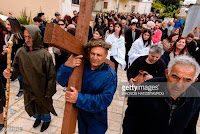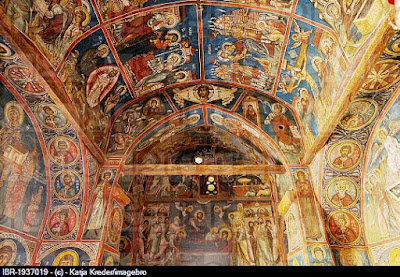Greek Orthodox Church
Church
 The Greek Orthodox church plays a big part in peoples lives. The majority of holidays are religious based and the religion is practiced by the majority of the Greek and Cypriot population. Religion is very much present in the education system (both in private and public schools) where children are forced to take religious education classes which teaches them about there religion. Religion is also very much present in the politics of the country.
The Greek Orthodox church plays a big part in peoples lives. The majority of holidays are religious based and the religion is practiced by the majority of the Greek and Cypriot population. Religion is very much present in the education system (both in private and public schools) where children are forced to take religious education classes which teaches them about there religion. Religion is also very much present in the politics of the country. Whether a person is religious or not, they usually tend to respect but also still attend church on Sunday out of respect for their grandparent or any other family member, but also are forced sometimes to attend church because most of the national holidays are religion based and we are forced to attend church out of the respect for our fallen heroes.
Easter
 |
| Tsoureki |
On Holy Thursday, eggs are dyed red (the colour of blood). it was believed that virgin Mary used to die eggs this colour to celebrate the resurrection of Christ and life. Also, women baking baking easter goods. Among these foods is Koulouria (dry cookeis) and tsoureki (sweet bread).
Godparents buy presents for the kids such as shoes, clothes and a candle for the church ceremonies. Also the exteriors of the houses in villages are whitewashed.
 |
| Epitafio |
During the night on Holy Saturday, everyone's wears their best outfits and makes their may to church with a white cnadle at 11pm. Just before midnight all of the lights are turned off symbolizing darkness and the silence of the tomb. At midnight, the priest lights a candle from the Eternal Flame and sings 'Christos Anesti' (Christ Arose), he then offers the flame to light the candle to the people closest to him, which gets passed on to everyone. Afterwards everyone goes to the streets while the church bells rings continuously and people say to one another Christos Anesti to which the other replies 'Alithos Anesti' or 'Alithos o kirios' (indeed he has risen). After the ceremony everyone makes their way home to their loved ones and share the Resurrection Meal. The candles which they have carried from church are placed in each house and burn through the night to symbolise the lights return to the world. After cracking the red dyed easter eggs (a traditional game played - it symbolizes Christ breaking away form the tomb). Main dishes served at Easter Sunday meal is roast lamb. Then follows Green Monday/ Kathari Deftera which marks the fist day of Lent (Saracosti) where families go for picnics and flt kites and go to tavernas and eat with families.
Name Day
Many Greeks considered this day more important than birthdays. Everyone is named after a saint and celebrates it each year. The person celebrating is visited by friends and family without invitation and offers them good wishes and small presents, along with savoury snacks and pastries.





Comments
Post a Comment